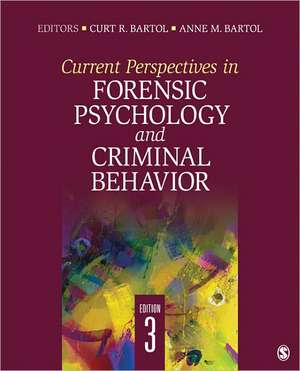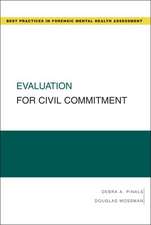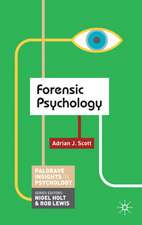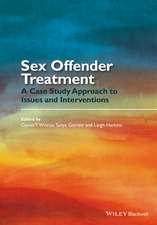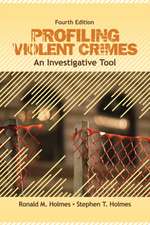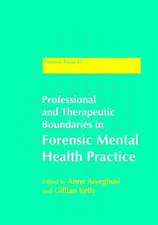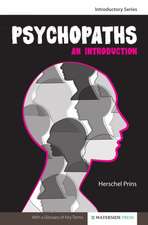Bartol, C: Current Perspectives in Forensic Psychology and C
en Limba Engleză Paperback – 30 apr 2011
Featuring ten new articles by experts in the field, this up-to-date reader emphasises the ways that forensic psychologists apply psychological knowledge, concepts, and principles on a day-to-day basis. Drawing on cutting-edge research to demonstrate the ways that forensic psychology has contributed to the understanding of criminal behaviour and crime prevention, the Third Edition addresses key topics in each of the five major subareas of the field - police psychology, legal psychology, the psychology of crime and delinquency, victimology and victim services, and correctional psychology.
Key Features of the Third Edition:
• readings include published journal articles, as well as commentaries written specifically for this book by forensics experts
• high-interest topics include serial murder, acquaintance rape, the relationship between mental disorders and crime and violence, sexual deviance, death penalty mitigation, restorative justice initiatives, arson and typologies of juvenile offenders, and sexual harassment
• the importance of ethnic and racial sensitivity to successful practice and research is emphasized throughout
• first-hand research-based reports help readers understand the contributions of forensic psychology to civil and criminal justice
• a password-protected teacher's site which includes test questions for the readings
• an open-access student study site which includes relevant articles, as well as articles from the previous edition of this book.
Preț: 291.99 lei
Nou
Puncte Express: 438
Preț estimativ în valută:
55.89€ • 60.32$ • 46.86£
55.89€ • 60.32$ • 46.86£
Carte tipărită la comandă
Livrare economică 17-23 aprilie
Preluare comenzi: 021 569.72.76
Specificații
ISBN-13: 9781412992442
ISBN-10: 1412992443
Pagini: 344
Dimensiuni: 190 x 231 x 15 mm
Greutate: 0.59 kg
Ediția:Third Edition
Editura: SAGE Publications
Locul publicării:Thousand Oaks, United States
ISBN-10: 1412992443
Pagini: 344
Dimensiuni: 190 x 231 x 15 mm
Greutate: 0.59 kg
Ediția:Third Edition
Editura: SAGE Publications
Locul publicării:Thousand Oaks, United States
Cuprins
Preface
UNIT 1: INTRODUCTION
1. Educational and Training Models in Forensic Psychology - David DeMatteo, Geoffrey Marczyk, Daniel A. Krauss, and Jeffrey Burl
UNIT 2: POLICE AND INVESTIGATIVE PSYCHOLOGY
2. Police Psychology: Then, Now, and Beyond - Curt R. Bartol
3. Science and Pseudoscience in Law Enforcement: A User-Friendly Primer - Scott O. Lilienfeld and Kristin Landfield
4. Effective Policing: Understanding How Polygraph Tests Work and Are Used - William G. Iacono
5. The Criminal Profiling Illusion: What’s Behind the Smoke and Mirrors? - Brent Snook, Richard M. Cullen, Craig Bennell, Paul J. Taylor, and Paul Gendreau
6. Juvenile Offenders’ Miranda Rights Comprehension and Self-Reported Likelihood of Offering False Confessions - Naomi E. Sevin Goldstein, Lois Oberlander Condie, Rachel Kalbeitzer, Douglas Osman, & Jessica L. Geier
UNIT 3: CRIMINAL AND DELINQUENT BEHAVIOR
Introduction and Commentary
7. Reducing Misconceptions and False Beliefs in Police and Criminal Psychology - Michael G. Aamodt
8. Drugs and Sexual Assault: A Review - Elena Pope & Michelle Shouldice
9. Is It Stalking? Perceptions of Stalking Among College Undergraduates - Lorraine Phillip, Ryan Quirk, Barry Rosenfeld, & Maureen O’Connor
10. Psychopathy: A Clinical Construct Whose Time Has Come - Robert D. Hare
11. Child Sexual Molestation: Research Issues - Robert A. Prentky, Raymond A. Knight, & Austin F. S. Lee
12. What Biosocial Criminology Offers Criminology - John Paul Wright and Danielle Boisvert
UNIT 4: LEGAL PSYCHOLOGY
Introduction and Commentary
13. Confession Evidence: Common Myths and Misconceptions - Saul M. Kassin
14. Hypnosis and the Law: Examining the Stereotypes - Graham F. Wagstaff
15. Assessing Allegations of Domestic Violence in Child Custody Evaluations - James N. Bow & Paul Boxer
16. Three Types of Skills for Effective Forensic Psychological Assessments - Marc Sageman
17. Developmentally Sensitive Forensic Interviewing of Preschool Children: Some Guidelines Drawn from Basic Psychological Research - Connie M. Tang
UNIT 5: VICTIMOLOGY AND VICTIM SERVICES
Introduction and Commentary
18. A 10-Year Update of “Review and Critique of Empirical Studies of Rape Avoidance” - Sarah E. Ullman
19. Reporting Sexual Victimization to the Police and Others: Results From a National-Level Study of College Women. - Bonnie S. Fisher, Leah E. Daigle, Francis T. Cullen, & Michael G. Turner
20. Patterns of Anti-Gay Violence: An Analysis of Incident Characteristics and Victim Reporting - Kristen Kuehnle & Anne Sullivan
21. Offenders’ Family Members’ Responses to Capital Crimes: The Need for Restorative Justice Initiatives - Sarah Eschholz, Mark D. Reed, Elizabeth Beck, & Pamela Blume Leonard
UNIT 6: CORRECTIONAL PSYCHOLOGY
Introduction and Commentary
22. A National Survey of Correctional Psychologists - Jennifer L. Boothby & Carl B. Clements
23. The Rehabilitation and Reintegration of Offenders: The Current Landscape and Some Future Directions for Correctional Psychology - J. Stephen Wormith, Richard Althouse, Mark Simpson, Lorraine R. Reitzel, Thomas J. Fagan, & Robert D. Morgan
24. What is Correctional About Clinical Practice in Corrections? - Philip R. Magaletta, Marc W. Patry, Erik F. Dietz, & Robert K. Ax
25. The Challenges of Mentally Ill Female Offenders in Prison - Elaine A. Lord
26. Multisystemic Therapy for Antisocial Juveniles: Suggestions for Improvement - Willem H. J. Martens
References
Index
UNIT 1: INTRODUCTION
1. Educational and Training Models in Forensic Psychology - David DeMatteo, Geoffrey Marczyk, Daniel A. Krauss, and Jeffrey Burl
UNIT 2: POLICE AND INVESTIGATIVE PSYCHOLOGY
2. Police Psychology: Then, Now, and Beyond - Curt R. Bartol
3. Science and Pseudoscience in Law Enforcement: A User-Friendly Primer - Scott O. Lilienfeld and Kristin Landfield
4. Effective Policing: Understanding How Polygraph Tests Work and Are Used - William G. Iacono
5. The Criminal Profiling Illusion: What’s Behind the Smoke and Mirrors? - Brent Snook, Richard M. Cullen, Craig Bennell, Paul J. Taylor, and Paul Gendreau
6. Juvenile Offenders’ Miranda Rights Comprehension and Self-Reported Likelihood of Offering False Confessions - Naomi E. Sevin Goldstein, Lois Oberlander Condie, Rachel Kalbeitzer, Douglas Osman, & Jessica L. Geier
UNIT 3: CRIMINAL AND DELINQUENT BEHAVIOR
Introduction and Commentary
7. Reducing Misconceptions and False Beliefs in Police and Criminal Psychology - Michael G. Aamodt
8. Drugs and Sexual Assault: A Review - Elena Pope & Michelle Shouldice
9. Is It Stalking? Perceptions of Stalking Among College Undergraduates - Lorraine Phillip, Ryan Quirk, Barry Rosenfeld, & Maureen O’Connor
10. Psychopathy: A Clinical Construct Whose Time Has Come - Robert D. Hare
11. Child Sexual Molestation: Research Issues - Robert A. Prentky, Raymond A. Knight, & Austin F. S. Lee
12. What Biosocial Criminology Offers Criminology - John Paul Wright and Danielle Boisvert
UNIT 4: LEGAL PSYCHOLOGY
Introduction and Commentary
13. Confession Evidence: Common Myths and Misconceptions - Saul M. Kassin
14. Hypnosis and the Law: Examining the Stereotypes - Graham F. Wagstaff
15. Assessing Allegations of Domestic Violence in Child Custody Evaluations - James N. Bow & Paul Boxer
16. Three Types of Skills for Effective Forensic Psychological Assessments - Marc Sageman
17. Developmentally Sensitive Forensic Interviewing of Preschool Children: Some Guidelines Drawn from Basic Psychological Research - Connie M. Tang
UNIT 5: VICTIMOLOGY AND VICTIM SERVICES
Introduction and Commentary
18. A 10-Year Update of “Review and Critique of Empirical Studies of Rape Avoidance” - Sarah E. Ullman
19. Reporting Sexual Victimization to the Police and Others: Results From a National-Level Study of College Women. - Bonnie S. Fisher, Leah E. Daigle, Francis T. Cullen, & Michael G. Turner
20. Patterns of Anti-Gay Violence: An Analysis of Incident Characteristics and Victim Reporting - Kristen Kuehnle & Anne Sullivan
21. Offenders’ Family Members’ Responses to Capital Crimes: The Need for Restorative Justice Initiatives - Sarah Eschholz, Mark D. Reed, Elizabeth Beck, & Pamela Blume Leonard
UNIT 6: CORRECTIONAL PSYCHOLOGY
Introduction and Commentary
22. A National Survey of Correctional Psychologists - Jennifer L. Boothby & Carl B. Clements
23. The Rehabilitation and Reintegration of Offenders: The Current Landscape and Some Future Directions for Correctional Psychology - J. Stephen Wormith, Richard Althouse, Mark Simpson, Lorraine R. Reitzel, Thomas J. Fagan, & Robert D. Morgan
24. What is Correctional About Clinical Practice in Corrections? - Philip R. Magaletta, Marc W. Patry, Erik F. Dietz, & Robert K. Ax
25. The Challenges of Mentally Ill Female Offenders in Prison - Elaine A. Lord
26. Multisystemic Therapy for Antisocial Juveniles: Suggestions for Improvement - Willem H. J. Martens
References
Index
Notă biografică
Curt R. Bartol was a college professor for more than 30 years, teaching a wide variety of both undergraduate and graduate courses, including Biopsychology, Criminal Behavior, Juvenile Delinquency, Introduction to Forensic Psychology, Social Psychology, and Psychology and Law. He earned his PhD in personality/social psychology from Northern Illinois University in 1972. He was instrumental in creating and launching Castleton State College's graduate program in forensic psychology and served as its director for 6 years. As a licensed clinical psychologist, he has been a consulting police psychologist to local, municipal, state, and federal law enforcement agencies for over 25 years. In addition to editing Current Perspectives, he has written Introduction to Forensic Psychology (forthcoming in its 4th edition), Criminal Behavior: A Psychosocial Approach (now in its 10th ed.), Juvenile Delinquency and Antisocial Behavior: A Developmental Perspective (3rd ed.), Criminal and Behavioral Profiling, and Psychology and Law (4th ed.). Anne M. Bartol earned an MA and a PhD in criminal justice from State University of New York at Albany. She also holds an MA in journalism from the University of Wisconsin-Madison. She taught criminal justice, sociology, and journalism courses over a 20-year college teaching career and has worked as a journalist and a social worker in child and adolescent protective services In addition to editing Current Perspectives, she has co-authored Introduction to Forensic Psychology, Juvenile Delinquency, Psychology and Law, and Criminal Behavior. She has served as book review editor and managing editor of Criminal Justice and Behavior and has published articles on women and criminal justice, rural courts, and the history of forensic psychology.
Descriere
Covering three major areas (criminal behaviour, forensic psychology, and psychology and law ) and comprising both journal articles and commentaries, this Reader provides students with first-hand reports from the field.
